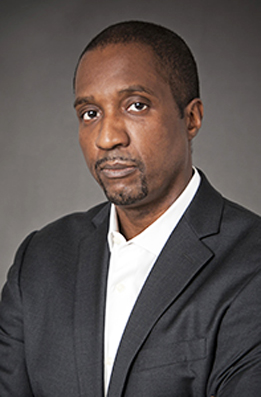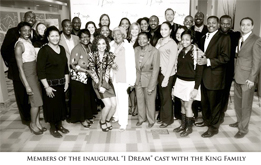|
Douglas Tappin Brings the MLK Experience to the World of
Opera
By Fletcher Word
Sojourner’s Truth Editor
When Douglas Tappin began
his creative work on I Dream, a rhythm and blues
opera about the last 36 hours of the life of Dr. Martin
Luther King, Jr., he felt more than a little trepidation
about the task he had undertaken. “It was an honor and very
daunting to tell the story, especially as an outsider,” he
recalls. It was an especially risky task, he realized, in
his adopted hometown of Atlanta, to create a piece of art
that would define such a crucial aspect of the slain civil
rights icon with authenticity.
Composer/librettist Tappin,
you see, is not from Atlanta. He’s not from Georgia. In
fact, he’s not even from the United States; so his
description of himself as an outsider, is perfectly fitting.
Born, reared and educated
in London, England, Tappin is a former commercial attorney
and member of the Honorable Society of Lincoln’s Inn. He
practiced as a barrister in England for 11 years but music
has been his passion since he taught himself to play the
piano when he was four year old. Throughout his school
years, he played a variety of instruments and composed music
during those rare moments he had in between his studies.
When he was practicing law in London, he composed, over a
number of years, a piece titled Moses and the Israelites
that was performed on the London stage in 2003.
|

Douglas Tappin
 |
|
During a performance he
had the opportunity to look at the audience, he says, and
noted how “they were moved by the story from laughter to
tears.” He asked God, he says, “I wonder what would happen
if I just did this?”
By chance he visited a
close friend in Atlanta soon after that and was introduced,
over a meal, to members of the faculty of the McAfee School
of Theology. Upon hearing about Tappin’s dilemma surrounding
his career choices, he was told: “It sounds like a calling
you are trying to understand.” They took that opportunity to
talk him into coming to their school to study theology and
assured him that he would have unfettered ability to explore
his musical desires as well.
Then all he had to do was
to convince his wife, also a Londoner, to leave her family
and friends and country, pack up their two small children –
ages one and four – and join him in an unknown city in an
unknown country in order to give up a solid, steady
occupation in order to pursue the dream of being an artist.
She agreed, they left
England, relocated to Atlanta, he earned a degree from
McAfee, devoted himself to his musical calling and
eventually composed a piece about the ancient King David and
King Saul which he titled King. In Atlanta “I was
challenged on my choice of the title,” he remembers. The
title, he was informed, was inappropriate for his adopted
hometown.
“I thought, ‘who was Dr.
Martin Luther King, Jr?’” So he started to read and
research. “Now I’ve read 60 to 70 books [on King],” he
notes, and absorbed FBI reports, newspaper accounts and oral
histories. And there are lots of oral histories given the
wealth of Atlanta memories, “I’ve spoken with everyone and
they have given me stories they had written down not knowing
who to give them to.” He’s reached out to black and white
folks in the area and around the nation – including white
ministers and rabbis who spent time with King. “I was
looking for a source of inspiration – I was praying and
looking,” he adds.
“The experience was so
visceral, so profound that I felt, literally, compelled to
tell the story – one of the greatest stories in human
history and, more particularly, a great American story of
recent history,” he says.
The first viewing of I
Dream, in its original format, was in Atlanta in 2010
before an audience containing some notable MLK associates,
such as Andrew Young, Joe Lowery (co-founder of the Southern
Christian Leadership Conference); Rev. Bernice King
(daughter of MLK); C.T. Vivian (close friend and colleague
of MLK) and Valerie Jackson (widow of former Atlanta Mayor
Maynard Jackson) The reviews from those most familiar with
Dr. Martin Luther King, Jr were overwhelmingly positive.
But Tappin’s creative
journey was not nearly complete. I Dream would
undergo many changes over the years that followed. By his
estimate, “the piece is now 60 percent different from the
Atlanta production.”
More on that in part two
of our discussion with the composer/librettist of I Dream. |